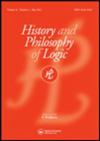The Cartesian Semantics of the Port Royal Logic
IF 0.5
3区 哲学
Q3 HISTORY & PHILOSOPHY OF SCIENCE
引用次数: 0
Abstract
types of argumentation. The results are unsatisfactory both because of unclarity in Aristotle’s classification and because of the fact that argumentation, at least as conceived by Walton, is a much broader category of verbal persuasive interaction than dialectic is for Aristotle and other ancient Greek authors. Reading the entire collection has given me the unfortunate impression that I am even more confused about what ‘dialectic’ and ‘argumentation’ are than when I began. This is not the fault of the authors but seems to be a problem with the concepts. For dialectic we are faced with trying to find some connection between the episteme producing dialectic of Republic VII and the competitive training exercises that Aristotle discusses in TopicsVIII. For argumentation we seem to be faced with an open-ended process of evaluation, counterargument, questioning, responding, etc., as indicated by Walton at the beginning of his article. One of the articles refers to a possible 40-year argumentation between a couple on some recurring problem in their relationship. To have a unified theory about this daunting range of material seems problematic. It seems as achievable as a unified theory of the novel or of football. This is not to say there aren’t interesting or even important things to be said about dialectic and argumentation, but certainly a novice should beware of a false impression of unity where there is rather diversity.Port Royal逻辑的笛卡尔语义
论证类型。这一结果并不令人满意,既因为亚里士多德的分类不明确,也因为论证,至少正如沃尔顿所设想的那样,对于亚里士多德和其他古希腊作家来说,是一个比辩证法更广泛的言语说服互动范畴。阅读整本书给我一种不幸的印象,那就是我比刚开始的时候更困惑于什么是“辩证法”和“论证”。这不是作者的错,但似乎是概念上的问题。对于辩证法,我们面临着试图在《理想国七》的产生认识论的辩证法和亚里士多德在《专题八》中讨论的竞争训练练习之间找到某种联系。对于论证,我们似乎面临着一个开放式的评估、反驳、质疑、回应等过程,正如沃尔顿在文章开头所指出的那样。其中一篇文章提到一对夫妇可能就他们关系中反复出现的一些问题进行了长达40年的争论。对这一令人生畏的材料范围有一个统一的理论似乎是有问题的。这似乎就像小说或足球的统一理论一样可以实现。这并不是说关于辩证法和论证没有什么有趣的甚至重要的东西可以说,但新手当然应该小心在存在相当多样性的地方给人一种团结的错误印象。
本文章由计算机程序翻译,如有差异,请以英文原文为准。
求助全文
约1分钟内获得全文
求助全文
来源期刊

History and Philosophy of Logic
综合性期刊-科学史与科学哲学
CiteScore
0.80
自引率
0.00%
发文量
24
审稿时长
>12 weeks
期刊介绍:
History and Philosophy of Logic contains articles, notes and book reviews dealing with the history and philosophy of logic. ’Logic’ is understood to be any volume of knowledge which was regarded as logic at the time in question. ’History’ refers back to ancient times and also to work in this century; however, the Editor will not accept articles, including review articles, on very recent work on a topic. ’Philosophy’ refers to broad and general questions: specialist articles which are now classed as ’philosophical logic’ will not be published.
The Editor will consider articles on the relationship between logic and other branches of knowledge, but the component of logic must be substantial. Topics with no temporal specification are to be interpreted both historically and philosophically. Each topic includes its own metalogic where appropriate.
 求助内容:
求助内容: 应助结果提醒方式:
应助结果提醒方式:


